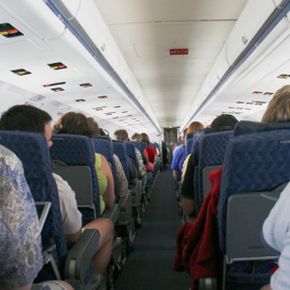The Budget Flight Experience
A lot of the business decisions that budget airlines make are invisible to passengers, but some are evident as soon as you fly on one.
Single-class seating is common. On most budget airlines, you won't find first class, business class or economy class. The entire plane is one class, with all the seats lined up in one cabin. It's basically like a bus with wings. Budget airlines also streamline things by eliminating reserved seats -- passengers file into the plane and choose their own seats on a first-come, first-served basis. This simplifies designing the interior of the planes, reduces the number of crew members required per flight and reduces the overhead necessary to run complicated booking systems. It also speeds up turnaround times, allowing the airline to schedule more flights and therefore make more money.
Advertisement
Short-haul and direct flights are common, too. Instead of scheduling long flights and transferring passengers at busy hubs, budget airlines emphasize short-haul flights that allow passengers to fly directly to their destination. This increases the number of scheduled flights, boosts profits and cuts down on waiting time on the ground.
Budget airlines also offer fewer cabin amenities. This can take many forms, from smaller, lightly padded seats to the absence of free meals and alcoholic beverages. The typical budget airline offers a basic seat and anything else a passenger wants in-flight can be had for an additional fee. Not every budget carrier follows this model, however. Some budget airlines differentiate themselves from their competitors by offering power connections for electronic devices, larger seats and other small perks.
Direct-ticket sales are another cost-saving tactic. If you go to an Internet travel site to book a flight, the site gets a cut of the ticket price from the airline. The same thing happens if you use a travel agent. Some budget airlines use the age-old cost-cutting practice of "cutting out the middleman," and not allowing their tickets to be sold through these third party outlets. Instead, they only sell tickets through their own Web site or at the ticket counter.
Some people fear that all the cost-cutting extends to safety and maintenance. We'll find out if there's any truth to it in the next section.
